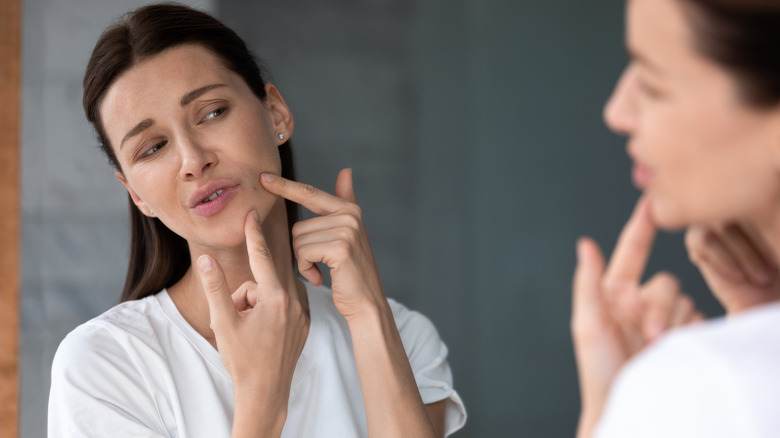Surprising Side Effects Of Taking Biotin
Biotin is a popular supplement usually taken to achieve thicker hair and nails. Some people swear by its benefits, but it's important to be aware of potential side effects before you start taking them either in pill or gummy form. Here's what you should know.
Biotin, also known as B-7 or vitamin H, is an essential vitamin B nutrient. Its bodily roles include forming fatty acids and glucose, as well as helping to turn the foods you eat into energy (via Healthline). It's also water-soluble, which means any excess biotin in your system is flushed out when you use the restroom.
Deficiencies of biotin are rare. Most people get enough of the vitamin from eating a balanced diet. It can be found naturally in foods like almonds, sweet potatoes, beef liver, eggs, fish, and other meats (via National Institutes of Health). Getting biotin from healthy foods also gives you the added benefits of protein, fiber, and other nutrients.
Unfortunately, there isn't a lot of evidence to suggest that taking a biotin supplement will benefit you in any way, Dr. Kimbre Zahn, M.D., family medicine physician at Indiana University Health, told Women's Health. "While there are some preliminary studies that may suggest a benefit [to taking biotin supplements], overall there is a lack of evidence to support these claims," Dr. Zahn states.
The potential downsides of biotin supplements
Not only have biotin supplements not shown to provide many benefits, but they can also come with some negative side effects. While some people claim their skin improves after taking a supplement, many others report skin problems such as acne. According to Dr. Yoram Harth, M.D., a board-certified dermatologist and medical director of MDacne, your body absorbs biotin the same way it absorbs vitamin B5, a vitamin that helps to prevent acne. Large biotin supplements can prevent B5 from being absorbed and might lead to cystic acne, Dr. Harth told Bustle.
Some people may also experience skin rashes or allergic reactions to biotin supplements as well. Finally, biotin has been known to interfere with the digestive system. This can cause nausea, cramping, gas, and diarrhea. Although overdosing on biotin is extremely rare due to its water solubility, these potential side effects are still enough to cause significant discomfort.
So should you take biotin? Probably not unless your doctor recommends it, and do consult with a physician if you have any questions or concerns. Alternatively, if you want stronger hair and nails, focus on eating a well-balanced diet and getting biotin from natural food sources.


